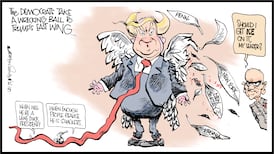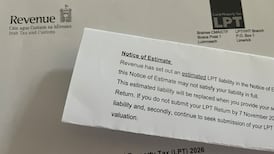The institutional Catholic Church differs little North and South. For anyone who wants to see, it is clear now that the clerical machine worldwide will only reform after exposure and punishment, writes Fionnuala O Connor.
But Northern Catholics may be slower than their co-religionists in the Republic to absorb how the institution has colluded with paedophile priests, the way they have been hidden in plain view and enabled to go on destroying children.
Examining consciences is as unwelcome a business for the laity, by the look of it, as for the priesthood.
Even in private, some are far from recognising that a kind of servile loyalty - as in the Republic - was vital to the cover-ups. Devout lay people who have sustained parishes for so long, always deferring to the priests in charge, have additional reasons in the North for valuing the church.
Perhaps the institution will only survive as a very different organism; maybe there will have to be women and married priests alongside the celibate to root out poisonous secrecy. Yet Catholics north of the Border debate these issues behind closed doors, if at all.
The instinct that says washing dirty linen in public will feed anti-Catholicism is still powerful, though for whatever reason there has been remarkably little Protestant/unionist comment on the Ferns report fallout.
Catholics come blinking into the sunshine of comparative peace very conscious that they are in better shape - politically and communally - than Protestants. It is surely ironic that they need every ounce of confidence to confront internal demons.
A large number supported the IRA through decades of violence, apparently with easy consciences. Part of the justification was that Catholics had been victims of bigoted Protestant security forces and state; biased institutions deserved no allegiance. In the scandals uncovered to date, the victims have all been Catholic children - Catholic victims of Catholic clergy.
The Northern-born priest Brendan Smyth - in the teeth of clerical obstruction and the Southern State's delay of an extradition warrant - was eventually jailed thanks to an investigation by the largely Protestant RUC.
The only credit to the community he came from was that it was a lay social worker from a Catholic Church agency in Belfast who reported him to the police, decades after bishops began shifting him round the world.
The Southern airwaves have seethed for years with the fallout from programmes revealing abuse. Northern comment is muted by contrast. BBC Radio Ulster's Talkback has none of the unselfconscious ease of Joe Duffy or Marian Finucane. Revelations of scandals have helped to empty churches in the Republic. They stay remarkably full in the North.
This is a congregation light years away from the South's relaxed and various Catholicism. Nor has there been a Northern Youth Defence to pillory the Catholic media for attacking the church: no need. The Irish News, founded as the bishops' weapon against the adulterer Parnell, has moved in lock-step with most readers, editorials shocked at the evil exposed, largely appreciative of the hierarchy's response, although "it would have been preferable if they had been much more open in the past . . ."
Last Sunday's reading in every parish of a "letter from the bishop" promising nothing new and calling for "healing" disappointed even some of the most pious, but brought no open protest. In a west Belfast church once served by Brendan Smyth and another convicted paedophile, someone swore under their breath after the reading, as a Mass-goer remarked later.
"But more than 30 years ago people walked out of that church when the priest criticised them from the pulpit for not going to the aid of a wounded soldier." In Belfast's most affluent parish, St Brigid's, several people brushed away an inquiry about their reaction with pleasant enough smiles. One man responded to being faced by a notebook with: "Are you here to do the church damage?" before segueing into insistence that the bishops should face prosecution. Another said reporters should ask the bishops what they were going to do now: "It'd have to be a Catholic reporter."
The Northern Catholic folk memory is still of a subordinate group huddled around the church, the single institution to which most gave unquestioned allegiance. The most recent shared experience is the war in which loyalists killed Catholics because they were Catholic, and paramilitaries from the Catholic community inflicted misery, pain and death.
The IRA could not have survived without the backing of people who would never have fired a shot or primed a bomb. There is that new Catholic confidence, but old habits die hard. The North has always been more buttoned up.
In Catholic circles, which of course are eternally surrounded by Protestant circles, once unquestioning faith in the clergy has gone: it is a matter for private grief rather than public display. Northern Catholics may be examining their consciences, but it will be a slow business.










